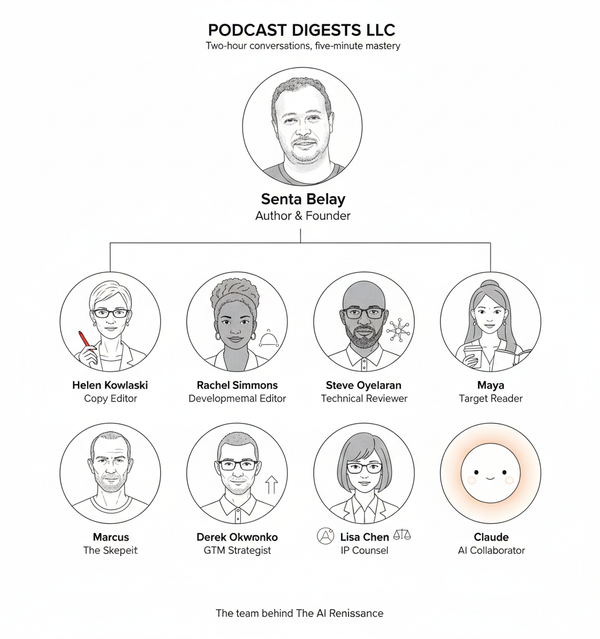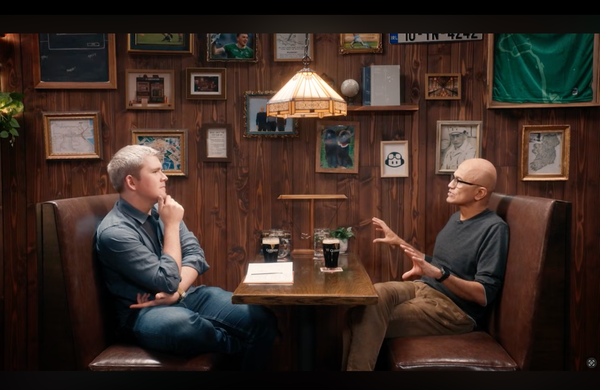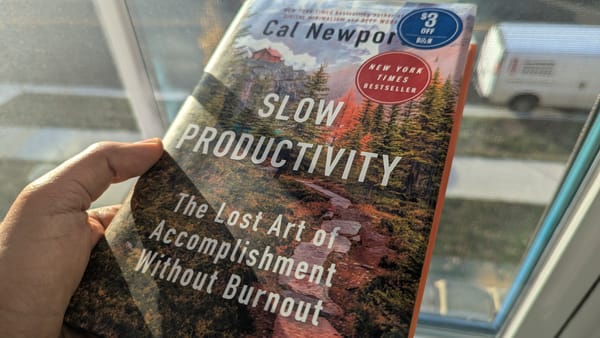Sundar Pichai on AI, the Future of Google, and the Power of a Humble Beginning with Lex Fridman
From a humble, two-room apartment in India to leading a $2 trillion technology company, Sundar Pichai's perspective is uniquely shaped by his journey. In a conversation with Lex Fridman, the CEO of Google and Alphabet detailed how a childhood defined by scarcity forged his deep-seated belief in technology's power and his optimistic vision for an AI-driven future
- The Formative Power of Scarcity
To understand Sundar Pichai's perspective on technology, you have to start with his childhood in Chennai, India. He paints a vivid picture of a life where technology was a rare and precious commodity. He recounts waiting five years for his family to get a rotary telephone, an event so significant it turned their home into a community hub where neighbors would come to call their loved ones. But the impact was most profound in the little things. A two-hour trip to the hospital to get blood test results, only to be told to come back the next day, became a five-minute affair. He shares stories of living through a massive drought with no running water, where he and his brother would wait in line for the family's ration of eight buckets of water from a truck. When they finally got running water, and eventually a water heater, the simple act of having a hot shower was a discrete, monumental leap in quality of life. These experiences, he explains, were like a "light bulb" going off in his head, instilling a firsthand, almost visceral understanding of how technology can radically alter the fabric of a person's life and expand their opportunities. ⏰ 00:05:09
- The Deeply Personal Drive Behind Google's Mission
Long before he would lead the company, the core mission of Google resonated with Pichai on a deeply personal level. Growing up in a world pre-computers, he describes how his access to the world's information came from books and newspapers. His grandfather was a huge influence, introducing him to the world of literature and politics, and fostering a love for reading everything from philosophy and Ayn Rand to "stupid crime novels". This constant hunger for knowledge, for access to information that was otherwise out of reach, became a defining part of his youth. He sees it as no surprise that he ended up at Google, a company whose entire existence is predicated on organizing the world's information and making it universally accessible. While he had to wait for almost every piece of technology, from a phone to a VCR, the one thing his family had in abundance was access to knowledge through books. That foundation made his life's work feel less like a career and more like a calling. ⏰ 00:04:34
- The Argument for AI as Humanity's Most Profound Technology
Pichai holds a conviction he first stated years ago: AI is the most profound technology humanity will ever work on, more significant than fire or electricity. He acknowledges the potential for recency bias—the tendency to overvalue what's happening now—but argues from first principles that AI is in a league of its own. What makes it unique, he explains, is that it's the first technology that is recursively self-improving and can dramatically accelerate creation itself. Unlike electricity or the internet, which were general-purpose technologies that affected everything, AI has the potential to build new things and achieve goals on its own. He describes the experience of watching AI models like AlphaGo learn from scratch or seeing early versions of Google’s own models progress as both inspiring and "a little bit unsettling" for a human to witness. This capability for novel, self-directed improvement is what he believes will allow AI's impact to far surpass anything we've seen before. ⏰ 00:15:26
- The Coming "AI Package" and the Explosion of Creativity
Drawing a parallel to the "Neolithic package" that came with the agricultural revolution, Pichai sees AI not just as a single tool, but as a catalyst for a whole suite of transformative changes. The most tangible change we're already seeing, he suggests, is the empowerment of human creativity on an unprecedented scale. AI will make it astonishingly easy for people to translate the thoughts in their heads into tangible things that exist in the world, whether it's software, content, or games. He likens this to how the internet enabled blogging and YouTube enabled video creation, but believes AI will expand that creative power from hundreds of thousands to tens of millions, or even a billion, people. He argues this expansionary aspect is vastly underestimated. Just as someone from the 1940s would have their mind blown by YouTube, he believes we will be similarly stunned by the landscape of creativity that AI makes possible in the next 10 to 20 years. ⏰ 00:21:18
- The Optimistic Take on P(Doom)
When Lex brings up the philosophical concept of "P(Doom)"—the probability of AI leading to human extinction—Pichai offers a surprisingly optimistic take. He acknowledges the underlying risk is very high, but his optimism isn't based on dismissing the danger. Instead, it’s rooted in a deep faith in humanity's ability to unite when faced with a sufficiently large threat. His thinking goes like this: if the probability of doom from AI is truly high, it becomes a problem that aligns all of humanity against it. He believes that when humanity collectively puts its mind to solving a problem, we can get there. This creates a "self-modulating aspect" where the very severity of the risk galvanizes the global cooperation needed to mitigate it. Because of this, while he doesn't downplay the threat, he remains hopeful that we will rise to meet the moment, making progress against the danger precisely because it’s so serious. ⏰ 00:44:54
- Navigating the Storm of Public Perception
Lex brings up the period just a year ago when articles were declaring that Google had lost the AI race and that Pichai was the wrong person to lead the company. Pichai's reflection on this time is a masterclass in leadership under pressure. He says he's good at tuning out noise and separating it from the signal, comparing the public chatter to the choppy surface of the ocean that is perfectly calm just a foot underneath. While analysts were doubting Google, he had a clear view of the internal trajectory. Key decisions, like the massive 10-year investment in Google's own TPUs (the specialized chips for AI), were already bearing fruit, and he could see the incredible progress being made on the Gemini models internally. For him, that moment of external doubt was internally a moment of immense opportunity, as he believed Google was better set up than any company in the world to realize the AI-first future he had been steering the company toward for years. ⏰ 00:53:41
- The Rationale Behind Merging Google's AI Giants
One of the most consequential decisions Pichai made during that turbulent period was merging Google's two world-class AI labs, DeepMind and Google Brain. He likens the challenge to being told to merge the computer science departments of Stanford and MIT—two phenomenal but culturally distinct teams—and expecting them to function as one cohesive unit. Brain was known for its bottoms-up, diverse research approach that led to major breakthroughs, while DeepMind was more mission-driven with a singular focus on achieving AGI. He felt the merger was a critical decision for the company to "meet the moment" and focus its immense talent on a unified goal. Despite the pressure and a few "sleepless nights," he credits the leadership of Demis Hassabis, Jeff Dean, and others for working incredibly hard to combine the best of both worlds, a patient process that he believes has set Google up for long-term success. ⏰ 00:56:39
- The Evolution of Google Search
Pichai also sheds light on the monumental decision to evolve Google Search, the iconic "front page of the internet," by integrating AI. He sees this as a natural progression, similar to how mobile forced Search to evolve beyond ten blue links to provide faster answers. The new AI Overviews and the separate "AI Mode" are designed to leverage the power of Gemini to give users richer context and the ability to have a dialogue with Search. However, he stresses that a core design principle remains unchanged: Google Search will always be a portal to the rich, human-created content on the web. The AI acts as a layer that helps you understand what's out there, fanning out to conduct multiple searches on your behalf and assembling that knowledge so you can explore more effectively. The goal isn't to replace the web, but to fuel curiosity and deliver higher quality referrals, helping people find what they're looking for on their journey of discovery. ⏰ 01:03:43
- The Future of Programming in an AI World
For the many programmers worried about AI taking their jobs, Pichai offers a reassuring perspective based on Google's own internal data. He reveals that while about 30% of code at Google now uses AI-generated suggestions, the more important metric is the overall increase in engineering velocity, which they've rigorously measured at 10% across the entire company. Yet, despite this massive productivity gain, Google plans to hire more engineers next year. Why? Because the opportunity space of what they can build is expanding even faster. He sees AI not as a replacement, but as a tool that will automate the grunt work of coding, freeing up engineers to spend more time on the fun parts: high-level design, architecture, and creative problem-solving. Ultimately, he believes it will make programming more enjoyable and put creative power into more people's hands, which in turn will create a demand for even more engineers to build more things. ⏰ 01:32:29
- The Vision for Android and Augmented Reality
Looking ahead, Pichai identifies augmented reality (AR) as the next major paradigm shift in computing, and he sees AI as the critical unlock for it. He explains that building great AR is an immense systems integration challenge, but the bigger hurdle has always been the user interface; it's simply too complex to interact with seamlessly without AI. This is where projects like Astra, Google's conversational AI agent, become essential for the future of platforms like Android XR. The vision is to move beyond the current paradigm of apps and shortcuts on a mobile OS and toward a more agentic system. This future Android would proactively understand your needs, learn from your repeated actions, and adapt to you, allowing you to simply describe what you want to accomplish and have the OS orchestrate it for you. It's a "moonshot," he admits, but one that is much closer to reality than people might think. ⏰ 01:38:25
- The Core of Humanity in an AI-Driven World
As the conversation draws to a close, Lex asks a profound question: as AI gets better at everything, what makes humans special? Pichai's answer is filled with a hopeful, humanistic vision for the future. He speaks about consciousness and the unique essence of humanity, acknowledging that the lines may blur over time. His ultimate aspiration is that by making resources more plentiful and the world less of a zero-sum game, AI will allow the best of our human values to surface more often. He hopes that empathy, kindness, and all the things that make us uniquely human will flourish in a world where scarcity is no longer the primary driver of our interactions. It's a future where technology doesn't replace our humanity, but instead creates the conditions for it to be amplified. ⏰ 01:48:32
The Most Humble CEO



